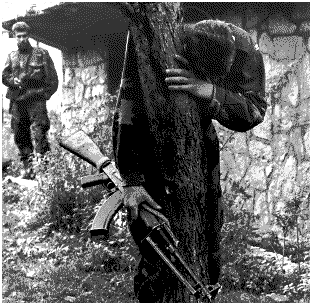Matthew Eck
(Milkweed)

Santiago, Zeller, and Santz fight their way out of their building, shooting at two of the enemy soldiers blocking their exit. Turns out the two they have killed were boys, playing with sticks.
There follows a long, dirty, dusty, hunger-ridden retreat from a city with the three men (Cooper is wounded, dies) knowing no one, trusting no one. They don't even know which way to go, how to get back to their base (which may or may not have been closed down). It's a nightmare.
No, it's worse. It is The Red Badge of Courage as narrated by Kafka, with details supplied by Hunter Thompson. It is a not so much a tale of modern soldiering as a parable of 21st Century warfare, no longer fought in the jungle or the trenches or from above, in the bomber ... but in the mind. What we used to call the American doughboy now finds himself in an unwelcoming environment of dust and unbearable heat, not knowing who is the enemy, who (if any) are those he is supposed to be helping. The enemy is everywhere.
We recall War and Peace, All Quiet on the Western Front, The Naked and the Dead, The Thin Red Line as expansive novels, exhaustingly so. The Farther Shore is so claustrophobic and ingrown that one has, at times, just to lay it down to avoid being suffocated by it. At one point Zeller, Santiago and Stantz find themselves living in a wrecked caboose, on a railroad that seems to lead nowhere. That's where they are: on an end-of-the-line war. Those who could have helped them to freedom somehow end up being shot or killed. It isn't only American soldier against the "terrorists;" it's those you are to be aiding fighting against each other. From a ruined house in a small village, Stantz witnesses the ritual castration of an adulterer, along with a slashing mutilation of the woman supposedly involved. These are the people who we are saving?
The whole brief tale --- 176 pages --- is spare, dry, enveloping, and won't let you be. When the three run across another American patrol they are told that they can be of no help, but then they gleefully report not only wreckage and refugees, but "a number of burnt bodies. Crispy critters, they called them." Later, Zeller comments,
- "I bet they'll make a movie about us..." His face was thin and pale by now, and his eyes were sunk deep in their sockets, surrounded by dark shadows. He'd lost a lot of weight. We all had. I wondered what I looked like. Maybe like a hero.
"They'll make a movie about us," said Santiago, "made for TV."
We all laughed.
After a while Santiago said, "I wonder if they'll include the kids we killed?"
Zeller and I were silent.
It is a ghastly story: powerful, ghostly, unrelieved. Even dying offers no freedom. Santiago asks Stantz, "Do you believe in ghosts?" "
"No."
"I do," he said. "I think we're given a choice when we die. We can go up or down, or we can stay right here. Those who choose to stay here are usually just too angry to go anywhere else. Or maybe too sad, I guess."